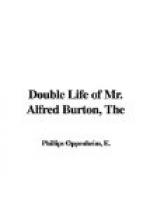“God bless my soul, Burton!” he exclaimed. “What an extraordinary child!”
Burton laughed, a little hoarsely.
“A few weeks ago,” he said, “that boy was running about the streets with greased hair, a butcher’s curl, a soiled velveteen suit, a filthy lace collar, dirty hands, torn stockings, playing disreputable games with all the urchins of the neighborhood. He murdered the Queen’s English every time he spoke, and spent his pennies on things you suck. His mother threw two of the beans I had procured with great difficulty for them both into the street. He picked one up and ate it—a wretched habit of his. You see the result.”
Mr. Bomford sat quite still and breathed several times before he spoke. It was a sign with him of most intense emotion.
“Mr. Burton,” he declared, “if this is true, that child is even a greater testimony to the efficacy of your—your beans, than you yourself.”
“There is no doubt,” Burton agreed, “that the change is even greater.”
There was a knock at the door. Burton, with a word of excuse, crossed the room to open it. The postman stood there with a packet. It was his novel returned once more. He threw it on to a table in the corner and returned to his place.
“Mr. Burton,” his visitor continued, “for the first time in my life—and I may say that I have been accustomed to public speaking and am considered to have a fair choice of words—for the first time in my life I confess that I find myself in trouble as to exactly how to express myself. I want to convince you. I am myself entirely and absolutely convinced as to the justice of the cause I plead. I want you to reconsider your decision of the other night.”
Burton shook his head.
“I am afraid,” he said, uneasily, “that that is not possible.”
Mr. Bomford cleared his throat. He was only externally a fool.
“Mr. Burton,” he declared, “you are an artist. Your child has the makings of a great artist. Have you no desire to travel? Have you no desire to see the famous picture galleries and cities of the Continent, cities which have been the birthplaces of the men whose works you and your son in days to come will regard with so much reverence?”
“I should like to travel very much indeed,” Burton admitted.
“It is the opportunity to travel which we offer you,” Mr. Bomford reminded him. “It is the opportunity to surround yourself with beautiful objects, the opportunity to make your life free from anxieties, a cultured phase of being during which, removed from all material cares, you can—er—develop yourself and the boy in any direction you choose.”
Mr. Bomford stopped and coughed. Again he was pleased with himself.




